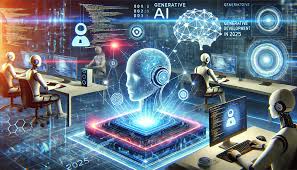In 2025, artificial intelligence (AI) is no longer an experimental add-on—it’s the engine driving innovation in mobile and web applications. With rapidly evolving technologies and increasing user expectations, AI app development is undergoing a paradigm shift. Today’s apps aren’t just built for functionality—they’re designed to think, learn, and adapt.
Two revolutionary technologies at the forefront of this transformation are predictive analytics and generative artificial intelligence. These are fundamental technologies that are influencing the development, deployment, and real-time optimization of programs rather than individual features. This blog examines the implications for companies, developers, and users in 2025 and beyond of how these AI capabilities are emerging as major forces in the app development ecosystem.
Generative AI: Powering Intelligent Content and Experiences
Generative AI refers to algorithms that can create content—text, images, video, audio, and even code—based on patterns and data inputs. In 2025, it’s one of the most powerful components in AI app development.
Applications in App Development:
- Conversational Interfaces: Chatbots and virtual assistants built with LLMs (Large Language Models) like GPT-4 and beyond are creating human-like conversations for customer support, healthcare, education, and e-commerce.
- Design and Personalization: Generative AI tools can dynamically generate personalized UI/UX elements, layouts, and messaging based on user preferences.
- Code Generation: AI-assisted coding tools reduce development time, fix bugs, and suggest improvements, allowing teams to ship faster.
By integrating generative capabilities, apps are becoming more responsive and intelligent—offering experiences tailored not just to demographic data but to individual user behaviors.
Predictive Analytics: Anticipating Needs Before They Arise
While generative AI focuses on creation, predictive analytics powers anticipation. It’s the practice of analyzing data to forecast future events, behaviors, or trends using statistical algorithms and machine learning.
How It Enhances AI App Development:
- User Retention: Apps use predictive models to identify users likely to churn and trigger proactive engagement strategies.
- Smart Recommendations: From shopping to streaming, predictive engines curate content or products based on usage history and preferences.
- Resource Optimization: Predictive analytics helps in load balancing, battery usage optimization, and server performance forecasting for mobile apps.
By embedding predictive analytics into mobile apps, developers create smarter, proactive systems that drive engagement, loyalty, and conversions.
Why These Technologies Matter in 2025
In 2025, creating AI-first infrastructures will be more important than adding clever features to AI apps. When paired with predictive analytics, generative AI enables apps to create previously unthinkable insight-driven interactions, hyper-personalized experiences, and real-time adaptation.
Here’s why they’re mission-critical:
1. User Expectations Have Evolved
Users of today want their apps to “know them.” They desire tailored feeds, voice assistance, predictive text, and pertinent recommendations. Less seems out of date.
2. Faster Time to Market
Generative AI reduces design and development cycles. It can auto-generate content, assist in prototyping, and improve testing—accelerating the release timeline.
3. Data Is the New Fuel
Large volumes of data are collected by modern apps. By turning such data into action, predictive analytics assists companies in making better decisions, boosting return on investment, and enhancing consumer happiness.
4. Competitive Advantage
Brands leveraging these AI technologies are outperforming competitors by offering smarter solutions and deeper user engagement.
Real-World Use Cases in 2025
- Healthcare Apps: Predictive models forecast patient health events, while generative AI assists doctors with auto-documentation and language translation.
- Retail & E-commerce: Apps predict buying behavior and generate dynamic offers or chat responses tailored to each user.
- Fintech: AI detects fraudulent behavior in real-time and provides users with smart financial advice through conversational agents.
- Education: Generative AI crafts lesson plans and feedback; predictive analytics tracks learning patterns to suggest personalized study material.
Building the Future: Considerations for AI App Developers
To fully leverage generative AI and predictive analytics in app development, teams should consider the following:
- Choose the Right AI Models: GPT-based models, custom ML frameworks, or industry-specific AI stacks should be chosen based on your product’s needs.
- Prioritize Ethical AI: Ensure fairness, transparency, and data privacy in all AI-driven decisions.
- Scalable Infrastructure: Deploy AI-ready backends using scalable cloud services like AWS, Azure, or GCP.
- Human-Centered Design: Keep user experience at the core while embedding AI features—let the AI augment, not overwhelm.
Final Thoughts
AI app development is evolving from a technical problem to a creative opportunity as a result of the convergence of generative AI and predictive analytics. With the use of these technologies, developers can create apps that are proactive, intuitive, and genuinely intelligent in addition to responsive.


